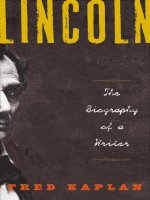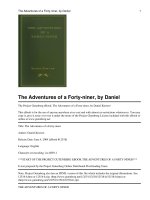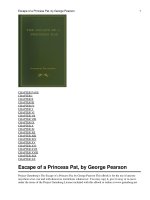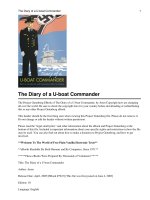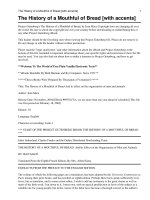The shadow of a crime
Bạn đang xem bản rút gọn của tài liệu. Xem và tải ngay bản đầy đủ của tài liệu tại đây (1.34 MB, 0 trang )
TheProjectGutenbergEBookofTheShadowofaCrime,byHallCaine
ThiseBookisfortheuseofanyoneanywhereatnocostandwith
almostnorestrictionswhatsoever.Youmaycopyit,giveitawayor
re-useitunderthetermsoftheProjectGutenbergLicenseincluded
withthiseBookoronlineatwww.gutenberg.org
Title:TheShadowofaCrime
ACumbrianRomance
Author:HallCaine
ReleaseDate:July16,2009[EBook#14262]
LastUpdated:March9,2018
Language:English
***STARTOFTHISPROJECTGUTENBERGEBOOKTHESHADOWOFACRIME***
ProducedbySuzanneShell,PaulWebb,TomMartin,DavidWidgerandthe
PGOnlineDistributedProofreadingTeam
THESHADOWOFACRIME
ACUMBRIANROMANCE
ByHallCaine
1885
Authorof“TheManxman,”“TheDeemster”etc.
“WhomGod'shandrestson,hasGod
Athisrighthand.”
NEWYORKHURST&COMPANYPUBLISHERS
1895
TO
MYABLEFELLOW-JOURNALIST
JOHNLOVELL
WHOINADARKERHOUROFLABORANDMISGIVING
CHEEREDMEWITHANESTIMATEOFTHISNOVEL
THATTHEPUBLICHASSINCERATIFIED.
CONTENTS
PREFACE.
THESHADOWOFACRIME.
CHAPTERI.THECITYOFWYTHBURN
CHAPTERII.THECRIMEINTHENIGHT
CHAPTERIII.INTHEREDLION
CHAPTERIV.THEOUTCAST
CHAPTERV.THEEMPTYSADDLE
CHAPTERVI.THEHOUSEONTHEMOSS
CHAPTERVII.SIM'SCAVE
CHAPTERVIII.ROBBIE'SREDEMPTION
CHAPTERIX.THESHADOWOFTHECRIME
CHAPTER X. MATTHA BRANTH'ET “FLYTES” THE
PARSON
CHAPTERXI.LIZA'SWILES
CHAPTERXII.THEFLIGHTONTHEFELLS
CHAPTERXIII.A'BATABLEPOINT
CHAPTERXIV.UNTILTHEDAYBREAK
CHAPTERXV.RALPH'SSACRIFICE
CHAPTERXVI.ATSUNRISEONTHERAISE
CHAPTERXVII.THEGARTHS:MOTHERANDSON
CHAPTERXVIII.THEDAWNOFLOVE
CHAPTERXIX.THEBETROTHAL
CHAPTERXX."FOOL,OFTHYSELFSPEAKWELL.”
CHAPTERXXI.MRS.GARTHATSHOULTHWAITE
CHAPTERXXII.THETHREATENEDOUTLAWRY
CHAPTERXXIII.SHENEVERTOLDHERLOVE
CHAPTERXXIV.TREASONORMURDER
CHAPTERXXV.LIZA'SDEVICE
CHAPTERXXVI."FOOL,DONOTFLATTER.”
CHAPTERXXVII.RALPHATLANCASTER
CHAPTERXXVIII.AFTERWORDCOMESWEIRD
CHAPTERXXIX.ROBBIE'SQUESTBEGUN
CHAPTERXXX.ARACEAGAINSTLIFE
CHAPTERXXXI.ROBBIE,SPEEDON!
CHAPTERXXXII.WHATTHESNOWGAVEUP
CHAPTERXXXIII.SEPULTUREATLAST
CHAPTERXXXIV.FATETHATIMPEDES,FALLBACK
CHAPTERXXXV.ROBBIE'SQUESTENDED
CHAPTERXXXVI.ROTHA'SCONFESSION
CHAPTERXXXVII.WHICHINDICTMENT?
CHAPTERXXXVIII.PEINEFORTEETDURE
CHAPTERXXXIX.THEFIERYHAND
CHAPTERXL.GARTHANDTHEQUAKERS
CHAPTERXLI.AHORSE'SNEIGH
CHAPTERXLII.THEFATALWITNESS
CHAPTERXLIII.LOVEKNOWNATLAST
CHAPTERXLIV.THECLEWDISCOVERED
CHAPTERXLV.THECONDEMNEDINDOOMSDALE
CHAPTERXLVI.THESKEINUNRAVELLED
CHAPTERXLVII.THEBLACKCAMELATTHEGATE
CHAPTERXLVIII."OUT,OUT,BRIEFCANDLE.”
CHAPTERXLIX.PEACE,PEACE,ANDREST
CHAPTERL.NEXTMORNING
CHAPTERLI.SIXMONTHSAFTER
PREFACE.
Thecentralincidentofthisnovelisthatmostextraordinaryofallpunishments
knowntoEnglishcriminallaw,thepeineforteetdure.Thestoryisnot,however,
in any sense historical. A sketchy background of stirring history is introduced
solely in order to heighten the personal danger of a brave man. The interest is
domestic,and,perhaps,insomedegreepsychological.Aroundapatheticpiece
ofoldjurisprudenceIhavegatheredamassofCumbrianfolk-loreandfolk-talk
with which I have been familiar from earliest youth. To smelt and mould the
chaoticmemoriesintoanorganismsuchasmayserve,amongotheruses,togive
aviewofCumberlandlifeinlittle,hasbeentheworkofoneyear.
Thestory,whichisnowfirstpresentedasawhole,hasalreadyhadacareerin
thenewspapers,andtheinterestitexcitedinthosequartershascomeuponmeas
a surprise. I was hardly prepared to find that my plain russet-coated dalesmen
wereintouchwithpopularsympathy;buttheyhavemadememanyfriends.To
metheyareverydear,forIhavelivedtheirlife.Itiswithnoaffectedregretthat
I am now parting with these companions to make way for a group of younger
comrades.
Thereisonethingtosaywhichwillmakeitworthwhiletotroublethereader
withthispreface.Asmallportionofthedialogueiswritteninamuchmodified
form of the Cumbrian dialect. There are four variations of dialect in
Cumberland, and perhaps the dialect spoken on the West Coast differs more
fromthedialectspokenintheThirlmereValleythanthelatterdiffersfromthe
dialectspokeninNorthLancashire.Thepatoisproblemisnottheleastseriousof
the many difficulties the novelist encounters. I have chosen to give a broad
outline of Cumbrian dialect, such as bears no more exact relation to the actual
speechthanasketchbearstoafinishedpicture.Itisrightasfarasitgoes.
Awordastothebackgroundofhistory.Ishalllookforthesympathyofthe
artist and the forgiveness of the historian in making two or three trifling legal
anachronismsthatdonotinterferewiththeinterestofthenarrative.Theyearof
thestoryisgiven,buttheaimhasbeentoreflectinthesepagestheblackcloud
of the whole period of the Restoration as it hung over England's remotest
solitudes.InmyrudesketchofthebeginningsoftheQuakermovementImust
disclaim any intention of depicting the precise manners or indicating the exact
doctrinalbeliefsoftherevivalists.If,however,IhavedescribedtheQuakersas
singingandprayingwiththefervoroftheMethodists,itmustnotbeforgotten
thatQuietismwasnosalientpartoftheQuakerismofFox;andifIhavehintedat
Calvinism,itmustberememberedthatthe“dividingofGod'sheritage”wasone
ofthecausesofthefirstschismintheQuakerSociety.
H.C.
NewCourt,Lincoln'sInn.
THESHADOWOFACRIME.
CHAPTERI.THECITYOFWYTHBURN.
Tar-rywoo',tar-rywoo',
Tar-rywoo'isilltospin:
Carditweel,carditweel,
Carditweelereyoubegin.OldBallad.
ThecityofWythburnstoodinanarrowvalleyatthefootofLauvellen,andat
theheadofBrackenWater.Itwasalittlebutpopulousvillage,inhabitedchiefly
by sheep farmers, whose flocks grazed on the neighboring hills. It contained
rather less than a hundred houses, all deep thatched and thick walled. To the
north lay the mere, a long and irregular water, which was belted across the
middlebyanoldRomanbridgeofbowlders.Abarepack-horseroadwoundits
wayonthewest,andstretchedoutofsighttothenorthandtothesouth.Onthis
road,abouthalfamilewithinthesouthernmostextremityofBrackenWater,two
hillocksmet,leavinganaturalopeningbetweenthemandapaththatwentupto
wherethecitystood.Thedalesmencalledthecleftbetweenthehillocksthecity
gates; but why the gates and why the city none could rightly say. Folks had
alwaysgiventhemthesenames.Thewiserheadsshookgravelyastheytoldyou
thatcityshouldbesarnty,meaningthehousebythecauseway.Thehistoriansof
theplaincouldsaynomore.
Theywererudesonsanddaughtersofthehillswhoinhabitedthismountain
home two centuries ago. The country around them was alive with ghostly
legend.TheyhadseenthelightsdanceacrossDeerGarthGhyll,andhadheard
the wail that came from Clark's Loup. They were not above trembling at the
mention of these mysteries when the moon was flying across a darksome sky,
whenthewindmoanedaboutthehouse,andtheyweregatheredaroundtheingle
nook. They had few channels of communication with the great world without.
Thepack-horsepedlerwastheirswiftestnewsman;thepedleronfootwastheir
weekly budget. Five miles along the pack-horse road to the north stood their
market town of Gaskarth, where they took their wool or the cloth they had
wovenfromit.FromthetopofLauvellentheycouldseethewhitesailsofthe
shipsthatfloateddownthebroadSolway.Thesewereallbuttheironlyglimpses
oftheworldbeyondtheirmountains.Itwasamysteriousandfearsomeworld.
Therewas,however,onelinkthatconnectedthepeopleofWythburnwiththe
worldoutside.Tothenorthofthecityandthemeretherelivedafamilyofsheep
farmers who were known as the Rays of Shoulthwaite Moss. The family
consistedofhusbandandwifeandtwosons.Theheadofthehouse,AngusRay,
came to the district early in life from the extreme Cumbrian border. He was
hardlylessthanagiantinstature.Hehadlimbsofgreatlength,andmuscleslike
the gnarled heads of a beech. Upon settling at Wythburn, he speedily acquired
property of various kinds, and in the course of a few years he was the largest
ownerofsheeponthecountryside.Certainly,fortunefavoredAngusRay,and
notleastnoticeablywheninduecoursehelookedabouthimforawife.
MaryRaydidnotseemtohavemanyqualitiesincommonwithherhusband.
Shehadneitherthestrengthoflimbnortheagilegraceofthemountaineer.This
waspartlytheresultoftheconditionsunderwhichhergirlhoodhadbeenspent.
Shewastheonlychildofadalesman,whohadsofaraccumulatedestateinland
as to be known in the vernacular as a statesman. Her mother had died at her
birth, and before she had attained to young womanhood her father, who had
marriedlateinlife,wasfeebleandunfitforlabor.Hishandwastoonervous,his
eyetoouncertain,hisbreathtooshortfortheconstantrisksofmountaineering;
so he put away all further thought of adding store to store, and settled himself
peaceablyinhiscottageunderCastenand,contentwiththeoccasionalpleasures
affordedbyhisfiddle,aninstrumentuponwhichhehadfromhisyouthupward
shownsomeskill.Inthisquietlifehisdaughterwashissolecompanion.
TherewasnosightinWythburnmoretouchingthantoseethisgirlsolacing
her father's declining years, meeting his wishes with anticipatory devices,
pamperinghiminhiswhims,soothinghimintheimaginarysorrowssometimes
incidenttoage,evenindulginghimwithasortofpathetichumorinhisfrequent
hallucinations.Todothisshehadtoputbyagoodmanyfelicitiesdeartoherage
andcondition,buttherewasnoapparentconsciousnessofself-sacrifice.Shehad
many lovers, for in these early years she was beautiful; and she had yet more
suitors,forshewasaccountedrich.Butneitherflatterynorthefervorofgenuine
passion seemed to touch her, and those who sought her under the transparent
guiseofseekingherfatherusuallywentawayastheycame.Shehadasmileand
the cheeriest word of welcome for all alike, and so the young dalesmen who
wooedherfromtheignoblemotivecametothinkheralittleofacoquette,while
those who wooed her from the purer impulse despaired of ruffling with the
gentlestgalesoflovethestillatmosphereofherheart.
Onedaysuddenly,however,theoldstatesmandied,andhisfiddlewasheard
nomoreacrossthevalleyinthequietoftheevening,butwasleftuntouchedfor
thedusttogatheronitwherehehimselfhadhungitonthenailinthekitchen
underhishat.Thenwhenlifeseemedtotheforlorngirlawideblank,aworld
without a sun in it, Angus Ray went over for the first time as a suitor to the
cottage under Castenand, and put his hand in hers and looked calmly into her
eyes.Hetoldherthatagirlcouldnotlivelonganunfriendedlifelikehers—that
sheshouldnotifshecould;shecouldnotifshewould—wouldshenotcometo
him?
Itwastheforceofthemagnettothesteel.Withswimmingeyesshelookedup
intohisstrongface,tendernowwithatremorneverbeforeseenthere;andashe
drew her gently towards him her glistening tears fell hot and fast over her
brighteningandnowradiantface,and,asthoughtohidethemfromhim,shelaid
herheadonhisbreast.ThiswasallthewooingofAngusRay.
They had two sons, and of these the younger more nearly resembled his
mother.WillyRayhadnotmerelyhismother'sfeatures;hehadherdisposition
also.Hehadtheroundedneckandlissomlimbsofawoman;hehadawoman's
complexion, and the light of a woman's look in his soft blue eyes. When the
years gave a thin curly beard to his cheek they took nothing from its delicate
comeliness.ItwasasifnaturehaddowntothelastmomentmeantWillyfora
girl. He had been an apt scholar at school, and was one of the few persons in
Wythburnhavingclaimstoeducation.Willy'selderbrother,Ralph,morenearly
resembledhisfather.Hehadhisfather'sstatureandstrengthoflimb,butsomeof
hismother'squalitieshadalsobeeninheritedbyhim.Inmannerhewasneither
soaustereandtaciturnashisfather,norsogentleandamiableashismother.He
wasbynomeansascholar,andonlythestronghandofhisfatherhadkepthim
asaboyinfearofthepenaltiesincurredbythetruant.Courageandresolution
werehisdistinguishingcharacteristics.
On one occasion, when rambling over the fells with a company of
schoolfellows,apoorblindlambranbleatingpastthem,ablackcloudofravens,
crows, and owl-eagles flying about it. The merciless birds had fallen upon the
innocentcreatureasitlaysleepingundertheshadowofatree,hadpickedatits
eyesandfedonthem,andnow,asthebloodtrickledinredbeadsdownitsnose,
they croaked and cried and screamed to drive it to the edge of a precipice and
thenovertoitsdeathinthegulfbeneath,theretofeastonitscarcass.Itwasno
easythingtofendoffthecruelbirdswheninsightoftheirprey,but,runningand
capturingthepoorlamb,Ralphsnatcheditupinhisarmsattheperilofhisown
eyes,andswungastaffabouthishead tobeatoffthe birdsastheydartedand
plungedandshriekedabouthim.
Itwasnaturalthataboylikethisshoulddevelopintothefinestshepherdon
the hills. Ralph knew every path on the mountains, every shelter the sheep
sought from wind and rain, every haunt of the fox. At the shearing, at the
washing,atthemarking,hishandwasamongthebest;andwhentheflockshad
to be numbered as they rushed in thousands through the gate, he could count
them,notbyonesandtwos,butbyfoursandsixes.Attheshearingfeastshewas
not above the pleasures of the country dance, the Ledder-te-spetch, as it was
called, with its one, two, three—heel and toe—cut and shuffle. And his strong
voice, that was answered oftenest by the echo of the mountain cavern, was
sometimes heard to troll out a snatch of a song at the village inn. But Ralph,
though havingan inclinationto convivialpleasures,was naturallyofaserious,
evenofasolemntemperament.Hewasarudesonofarudecountry,—rudeof
hand,oftenrudeoftongue,untutoredinthegracesthatgivebeautytolife.
BythetimethatRalphhadattainedtothefullmaturityofhismanhood,the
struggles of King and Parliament were at their height. The rumor of these
struggles was long in reaching the city of Wythburn, and longer in being
discussed andunderstoodthere;but,to everybody'ssurprise,youngRalphRay
announced his intention of forthwith joining the Parliamentarian forces. The
extraordinary proposal seemed incredible; but Ralph's mind was made up. His
fathersaidnothingabouthisson'sintentions,goodorbad.Theladwasofage;
he might think for himself. In his secret heart Angus liked the lad's courage.
Ralphwas“naneo'yerfecklessfowk.”Ralph'smotherwassorelytroubled;but
justasshehadyieldedtohisfather'swillinthedaysthatwerelonggoneby,so
sheyieldednowtohis.Theinterveningyearshadbroughtanaddedgentlenessto
her character; they had made mellower her dear face, now ruddy and round,
thoughwrinkled.Folkssaidshehadlookedhappierandhappier,andhadtalked
lessandless,asthetimeworeon.IthadbecomeasayinginWythburnthatthe
dameofShoulthwaiteMosswasneverseenwithoutasmile,andneverheardto
saymorethan“Godblessyou!”Thetearsfilledhereyeswhenhersoncameto
kissheronthemorningwhenheleftherhomeforthefirsttime,butshewiped
themawaywithherhousewife'sapron,anddismissedhimwithheraccustomed
blessing.
RalphRayjoinedCromwell'sarmyagainstthesecondCharlesatDunbar,in
1650.BetweentwoandthreeyearsafterwardshereturnedtoWythburncityand
resumedhisoldlifeonthefells.Therewaslittlemoreforthetrain-bandstodo.
Charles had fled, peace was restored, the Long Parliament was dissolved,
CromwellwasLordProtector.OutwardlytheyoungRoundheadwasnotaltered
bythecampaign.Hehadpassedthroughitunscathed.Hewassomewhatgraver
in manner; there seemed to be a little less warmth and spontaneity in his
greeting;hisvoicehadlostoneortwoofitscheeriernotes;hislaughterwasless
hearty and more easily controlled. Perhaps this only meant that the world was
doingitsworkwithhim.Otherwisehewasthesameman.
When Ralph returned to Wythburn he brought with him a companion much
olderthanhimself,whoforthwithbecameaninmateofhisfather'shome,taking
part as a servant in the ordinary occupations of the male members of the
household. This man had altogether a suspicious and sinister aspect which his
manners did nothing to belie. His name was James Wilson, and he was
undoubtedly a Scot, though he had neither the physical nor the moral
characteristics of his race. His eyes were small, quick, and watchful, beneath
heavyandjaggedbrows.Hewasslightoffigureandlowofstature,andlimped
ononeleg.Hespokeinathinvoice,halflaugh,halfwhimper,andhardlyever
lookedintothefaceofthepersonwithwhomhewasconversing.Therewasan
air of mystery about him which the inmates of the house on the Moss did
nothingtodissipate.RalphofferednoexplanationtothegossipsofWythburnof
Wilson'sidentityandbelongings;indeed,astimeworeon,itcouldbeobserved
thatheshowedsomeuneasinesswhenquestionedabouttheman.
AtfirstWilsoncontrivedtoingratiatehimselfintoagooddealoffavoramong
the dalespeople. There was then an insinuating smoothness in his speech, a
flattering,almostfawningglibnessoftongue,whichthesimplefolksknewnoart
to withstand. He seemed abundantly grateful for some unexplained benefits
receivedfromRalph.“Atweel,”Wilsonwouldsay,withhiseyesontheground,
—“atweelIlo'ethebrawchielas'tweremyainguidbillie.”
Ralph paid no heed to the brotherly protestations of his admirer, and
exchangedonlysuchwordswithhimastheiroccupationsrequired.OldAngus,
however, was not so passive an observer of his new and unlooked-for
housemate.“He'sagoodfornoughtsortofafellow,slenkenfraeplacetoplace
wi' nowt but a sark to his back,” Angus would say to his wife. Mr. Wilson's
physical imperfections were an offence in the dalesman's eyes: “He's as
widderful in his wizzent old skin as his own grandfather.” Angus was not less
severe on Wilson's sly smoothness of manner. “Yon sneaking old knave,” he
would say, “is as slape as an eel in the beck; he'd wammel himself into
crookedest rabbit hole on the fell.” Probably Angus entertained some of the
antipathytoScotchmenwhichwaspeculiartohisage.“I'llswearhe'sataistrel,”
hesaidoneday;“IdarenottrusthimwithamessofpoddishuntilI'dhadthe
firstsup.”
Inspiteofthisdetermineddisbeliefonthepartoftheheadofthefamily,old
Wilson remained for a long time a member of the household at Shoulthwaite
Moss, following his occupations with constancy, and always obsequious in the
acknowledgment of his obligations. It was observed that he manifested a
peculiareagernesswhenthroughanystraychannelintelligencewasreceivedin
thevalleyofthesayingsanddoingsintheworldoutside.Nothingwasthought
ofthisuntilonedaythepassingpedlerbroughtthestartlingnewsthattheLord
Protectorwasdead.Thefamilywereatbreakfastinthekitchenoftheoldhouse
whenthistardyrepresentativeoftheheraldMercuryarrived,and,inreplytothe
customary inquiry as to the news he carried, announced the aforesaid fact.
Wilsonwasalivetoitssignificancewithacuriouswakefulness.
“It'sbrawtidingsyebringtheday,man,”hestammeredwithevidentconcern,
andwithanefforttohidehisnervousness.
“Yes, the old man's dead,” said the pedler, with an air of consequence
commensurate with his message. “I reckon,” he added, “Oliver's son Richard
willbeProtectornow.”
“Asairycarle,thatsameRichard,”answeredWilson;“Iwotth'youngCharles
'ulsooncomebyhisain,andthenilkaaneamangus'ulseeabonniewar-day.
We'veplaytatshintylangeneugh.Brawnews,man—brawnewsthatthecorbie's
deid.”
Wilson had never before been heard to say so much or to speak so
vehemently.Hegotupfromthetableinhisnervousness,andwalkedaimlessly
acrossthefloor.
“Why are you poapan about,” asked Angus, in amazement; “snowkin like a
pigatasow?”
AtthisthesinisterlightinWilson'seyesthathadbeenheldincheckhitherto
seemedatoncetoflashout,andheturnedhotlyuponhismaster,asthoughto
retortsneerforsneer.But,checkinghimself,hetookuphisbonnetandmadefor
thedoor.
“Don'tlookatmelikethat,”Anguscalledafterhim,“or,maybeI'llclashthe
doorinthyface.”
Wilsonhadgonebythistime,andturningtohissons,Anguscontinued,—
“Did you see how the waistrel snirpt up his nose when the pedler said
Cromwellwasdead?”
It was obvious that something more was soon to be made known relative to
theirfarmservant.Thepedlerhadnodifficultyincomingtotheconclusionthat
Wilsonwassomesecretspy,somedisguisedenemyoftheCommonwealth,and
perhapssomeFifthMonarchyman,andarankPapisttoboot.Mrs.Ray'sserene
facewasunruffled;shewassurethepoormanmeantnoharm.Ralphwassilent,
asusual,buthelookedtroubled,andgettingupfromthetablesoonafterwards
he followed the man whom he had brought under his father's roof, and who
seemedlikelytocausedissensionthere.
Notlongafterthiseventfulmorning,RalphoverheardhisfatherandWilsonin
hot dispute at the other side of a hedge. He could learn nothing of a definite
nature. Angus was at the full pitch of indignation. Wilson, he said, had
threatenedhim;or,atleast,hisownfleshandblood.Hehadtoldthemannever
tocomenearShoulthwaiteMossagain.
“An'hedoes,”saidthedalesman,hiseyesaflame,“I'lltoitlehimintothebeck
tillhe'saswankleasawetsack.”
He was not so old but that he could have kept his word. His great frame
seemed closer knit at sixty than it had been at thirty. His face, with its long,
square, gray beard, looked severer than ever under his cloth hood. Wilson
returnednomore,andthepromiseofadrenchingwasneverfulfilled.
The ungainly little Scot did not leave the Wythburn district. He pitched his
tentwiththevillagetailorinalittlehouseatFornside,closebytheMoss.The
tailor himself, Simeon Stagg, was kept pitiably poor in that country, when one
sack coat of homespun cloth lasted a shepherd half a lifetime. He would have
livedasolitaryaswellasamiserablelifebutforhisdaughterRotha,agirlof
nineteen, who kept his little home together and shared his poverty when she
mighthaveenjoyedthecomfortsofeasierhomeselsewhere.
“Yourfatherisnothingbutanacheandastoundtoyou,lass,”Simwouldsay
inawhimper.“It'llbewellforyou,Rotha,whenyougivememylasttop-sark
andtakemetothekirkyardyonder,”thelittlemanwouldsnuffleaudibly.
“Hush,father,”thegirlwouldsay,puttingthepalmofherhandplayfullyover
hismouth,“you'llbesonsie-lookingyet.”
Simwasheavilyindebt,andthispreyedonhismind.Hehadalwaysbeena
grewsome body, sustaining none of the traditions of his craft for perky gossip.
HencehewasnofavoriteinWythburn,wherefewornonevisitedhim.Latterly
Sim'stroublesseemedtodrivehimfromhishomeforlongwalksinthenight.
While the daylight lasted his work gave occupation to his mind, but when the
darknesscameonhehadnoescapefromhauntingthoughts,androamedabout
the lanes in an effort to banish them. It was to this man's home that Wilson
turned when he was shut out of Shoulthwaite Moss. Naturally enough, the
sinisterScotwasawelcomeifnotanagreeableguestwhenhecameaslodger,
withmoneytopay,wherepovertyitselfseemedhost.
OldWilsonhadnotchosenthetailor'shouseashishomeonaccountofany
comforts it might be expected to afford him. He had his own reasons for not
quitting Wythburn after he had received his very unequivocal “sneck posset.”
“Betteraweebush,”hewouldsay,“thannabield”.Sheltercertainlythetailor's
homeaffordedhim;andthatwasallthatherequiredforthepresent.Wilsonhad
notbeenlonginthetailor'scottagebeforeSimseemedtogrowuneasyundera
fresh anxiety, of which his lodger was the subject. Wilson's manners had
obviouslyundergoneachange.Hisearlysmoothness,hisslaveringglibness,had
disappeared. He was now as bitter of speech as he had formerly been
conciliatory. With Sim and his troubles, real and imaginary, he was not at all
careful to exhibit sympathy. “Weel, weel, ye must lie heids and thraws wi'
poverty, like Jock an' his mither”; or, “If ye canna keep geese ye mun keep
gezlins.”
Simwasindebttohislandlord,andovertheideaofejectmentfromhislittle
dwellingthetailorwouldbrooddayandnight.Folkssaidhewasgoingcrazed
aboutit.NonethelesswasSim'sdistressaspoignantasifthegroundsforithad
been more real. “Haud thy bletherin' gab,” Wilson said one day; “because ye
havetobecanniewi'thecreamyethinkyemustsurelybeclemm'd.”Salutaryas
someoftheScotsman'scommentsmayhavebeen,itwasnaturalthatthechange
inhismannersshouldexcitesurpriseamongthedalespeople.Thegoodpeople
expressed themselves as “fairly maizelt” by the transformation. What did it all
mean?Therewassurelysomethingbehindit.
The barbarity of Wilson's speech was especially malicious when directed
against the poor folks with whom he lived, and who, being conscious of how
essential he was to the stability of the household, were largely at his mercy. It
happenedononeoccasionthatwhenWilsonreturnedtothecottageafteraday's
absence,hefoundSim'sdaughterweepingoverthefire.
“What'snow?”heasked.“Haveyenothinginthekail?”
Rothasignifiedthathissupperwasready.
“Thoulimmer,”saidWilson,inhisthinshriek,“howlong'ulthydoollast?It's
namairtoseeawomangreetthantoseeagoosegangbarefit.”
RalphRaycalledatthetailor'scottagethemorningafterthis,andfoundSim
suffering under violent excitement, of which Wilson's behavior to Rotha had
been the cause. The insults offered to himself he had taken with a wince,
perhaps, but without a retort. Now that his daughter was made the subject of
them,hewasprofoundlyagitated.
“ThereIsat,”hecried,ashisbreathcameandwentingusts,—“thereIsat,a
poorbarrow-back'tcreature,andheardthatoldsavvorlessloonspithisspiteat
mylass.I'mnoneofabraveman,Ralph:no,Imustbeacoward,butIwentnigh
tosnatchingupyonflailofhisandstrikinghim—aye,killinghim!—butno,it
mustbethatI'macoward.”
Ralphquietedhimaswellashecould,tellinghimtoleavethisthingtohim.
RalphwasperhapsSim'sonlyfriend.Hewouldoftenturn inlikethisatSim's
workroom as he passed up the fell in the morning. People said the tailor was
indebtedtoRalphforproofsoffriendshipmoresubstantialthansympathy.And
now,whenSimhadthepromiseofastrongfriend'sshouldertoleanon,hewas
unmanned, and wept. Ralph was not unmoved as he stood by the forlorn little
man,andclaspedhishandsinhisownandfeltthewarmtearsfalloverthem.
Astheyoungdalesmanwasleavingthecottagethatmorning,heencountered
in the porch the subject of the conversation, who was entering in. Taking him
firmlybutquietlybytheshoulder,heledhimbackafewpaces.Simhadleaptup
fromhisbench,andwaspeeringeagerlythroughthewindow.ButRalphdidno
violencetohislodger.Hewassayingsomethingwithmarkedemphasis,butthe
wordsescapedthetailor'sears.Wilsonwasansweringnothing.Loosinghishold
ofhim,Ralphwalkedquietlyaway.Wilsonenteredthecottagewithalividface,
andmurmuring,asthoughtohimself,—
“Aiblinswemaybequitsyet,mychiel'.Agreatstourhasbegoon,mybirkie.
Yourfire-flauchte'ewullnafleyme.YourCromwell'sgane,an'alltraitorsshall
trystewi'thehangman.”
It was clear that whatever the mystery pertaining to the Scotchman, Simeon
Stagg seemed to possess some knowledge of it. Not that he ever explained
anything. His anxiety to avoid all questions about his lodger was sufficiently
obvious.YetthathehadsomehowobtainedsomehintofadarksidetoWilson's
character, every one felt satisfied. No other person seemed to know with
certainty what were Wilson's means of livelihood. The Scotchman was not
employed by the farmers and shepherds around Wythburn, and he had neither
land nor sheep of his own. He would set out early and return late, usually
walking in the direction of Gaskarth. One day Wilson rose at daybreak, and
putting a threshing-flail over his shoulder, said he would be away for a week.
ThatweekensuingwasaquietonefortheinmatesofthecottageatFornside.
Sim's daughter, Rotha, had about this time become a constant helper at
ShoulthwaiteMoss,where,indeed,shewastreatedwiththecordialityproperto
amemberofthehousehold.OldAngushadbutlittlesympathytospareforthe
girl's father, but he liked Rotha's own cheerfulness, her winsomeness, and, not
least,herusefulness.Shecouldmilkandchurn,andbakeandbrew.Thiswasthe
sortofyoungwomanthatAnguslikedbest.“Rotha'sarightheartsomelassie,”
he said, as he heard her in the dairy singing while she worked. The dame of
Shoulthwaitelovedeveryone,apparently,buttherewerespecialcornersinher
heartforherfavorites,andRothawasoneofthem.
“Cannot that lass's father earn aught without keeping yon sulking waistrel
abouthim?”askedtheolddalesmanoneday.
It was the first time he had spoken of Wilson since the threatened ducking.
Being told of Wilson's violence to Rotha, he only said, “It's an old saying, 'A
blate cat makes a proud mouse.'” Angus was never heard to speak of Wilson
again.
NatureseemedtohavemeantRothaforablithe,bird-likesoul,buttherewere
darkerthreadswovenintothewoofofhernaturalbrightness.Shewastall,slight
offigure,withalittleheadofalmostelfishbeauty.Atmilking,atchurning,at
baking,hervoicecouldbeheard,generallysingingherfavoritebordersong:—
“Gaetakthisbonnienebo'mine,
Thatpecksamangthecorn,
An'gi'e'ttotheDukeo'Hamilton
Tobeatoutinghorn.”
“RobinRedbreasthasablitheinterpreter,”saidWillyRay,asheleanedfora
moment against the open door of the dairy in passing out. Rotha was there
singing,whileinasnow-whiteapron,andwitharmsbareabovetheelbows,she
weighed the butter of the last churning into pats, and marked each pat with a
rude old mark. The girl dropped her head and blushed as Willy spoke. Of late
she had grown unable to look the young man in the face. Willy did not speak
again.Hisfacecolored,andhewentaway.Rotha'smannertowardsRalphwas
different.Hespoketoherbutrarely,andwhenhedidsoshelookedfranklyinto
hisface.Ifshemethimabroad,asshesometimesdidwhencarryingwaterfrom
thewell,hewouldliftherpailsinhisstrongerhandsoverthestile,andatsuch
timesthegirlthoughthisvoiceseemedsofter.
“I am thinking,” said Mrs. Ray to her husband, as she was spinning in the
kitchen at Shoulthwaite Moss,—“I am thinking,” she said, stopping the wheel
and running her fingers through the wool, “that Willy is partial to the little
tailor'swinsomelass.”
“AndwhatabootRalph?”askedAngus.
CHAPTERII.THECRIMEINTHENIGHT.
On the evening of the day upon which old Wilson was expected back at
Fornside, Ralph Ray turned in at the tailor's cottage. Sim's distress was, if
possible,evengreaterthanbefore.Itseemedasifthegloomyforebodingsofthe
villagers were actually about to be realized, and Sim's mind was really giving
way. His staring eyes, his unconscious, preoccupied manner as he tramped to
andfroinhislittlework-room,sittingatintervals,risingagainandresuminghis
perambulations, now gathering up his tools and now opening them out afresh,
talking meantime in fitful outbursts, sometimes wholly irrelevantly and
occasionallywithastartlingpertinency,—allthis,thoughnomorethananexcess
of his customary habit, seemed to denote a mind unstrung. The landlord had
calledthatmorningforhisrent,whichwaslonginarrears.Hemusthaveit.Sim
laughedwhenhetoldRalphthis,butitwasashockinglaugh;therewasnoheart
in it. Ralph would rather have heard him whimper and shuffle as he had done
before.
“Youshallnotbehomeless,Sim,iftheworstcomestotheworst,”hesaid.
“Homeless,notI!”andthelittlemanlaughedagain.Ralphfeltunease.This
changewasnotforthebetter.Rothahadbeensittingatthewindowtocatchthe
lastglimmerofdaylightasshespun.Itwasdusk,butnotyettoodarkforRalph
toseethetearsstandinginhereyes.Presentlysheroseandwentoutoftheroom.
“NeverfearthatIshallbeclemm'd,”saidSim.“No,no,”hesaid,withagrin
ofsatisfiedassurance.
“Godforbid!”saidRalph,“butthingsshouldbebettersoon.Thisistheback
end,youknow.”
“Aye,”answeredthetailor,withashrugthatresembledashiver.
“Andtheysay,”continuedRalph,“thebackendisalwaysthebareend.”
“Andtheysay,too,”saidSim,“changeisleetsome,ifit'sonlyoutofbedinto
thebeck!”
The tailor laughed loud, and then stopped himself with a suddenness quite
startling. The jest sounded awful on his lips. “You say the back end's the bare
end,”hesaid,cominguptowhereRalphsatinpainandamazement;“mine'sall
bareend.It'snothingbut'bareend'forsomeofus.Yesterdaymorningwaswet
andcold—youknowhowcolditwas.Well,Rothahadhardlygoneoutwhena
tapcametothedoor,andwhatdoyouthinkitwas?Awoman,awomanthinand
blear-eyed.Someonemusthavecountedherfacebonnieonce.Shewasscarce
olderthanmyownlass,butshe'dapoorweakbarnatherbreastandaweelad
thattrudgedatherside.Shewaswetandcold,andaskedforrestandshelterfor
herselfandthechildren-restandshelter,”repeatedthetailorinalowertone,as
thoughmutteringtohimself,—“restandshelter,andfromme.”
“Well?”inquiredRalph,notnoticingSim'sself-reference.
“Well?”echoedSim,asthoughRalphshouldhavedivinedthesequel.
“Hadthepoorcreaturebeenturnedoutofherhome?”
“Thatandworse,”saidthelittletailor,hisframequiveringwithemotion.“Do
youknowtheking'scomebyhisownagain?”Simwasspeakinginanaccentof
thebitterestmockery.
“Worseluck,”saidRalph;“butwhatofthat?”
“Why,”saidSim,almostscreaming,“thateverymaninthelandwhofought
fortheCommonwealtheightyearsagoisliketobeshotasatraitor.Didn'tyou
knowthat,mylad?”Andthelittlemanputhishandswithafeverishclutchon
Ralph'sshoulders,andlookedintohisface.
For an instant there was a tremor on the young dalesman's features, but it
lasted only long enough for Sim to recognize it, and then the old firmness
returned.
“Butwhatofthepoorwomanandherbarns?”Ralphsaid,quietly.
“Herhusband,anoldRoundhead,hadfledfromawarrantforhisarrest.She
hadbeencasthomelessintotheroad,sheandallherhousehold;heragedmother
haddiedofexposurethefirstbitternight,andnowfortwolongweeksshehad
walked on and on—on and on—her children with her—on and on—living
Heavenknowshow!”
AlightnowseemedtoRalphtobecastonthegreatchangeinhisfriend;but
was it indeed fear for his (Ralph's) well-being that had goaded poor Sim to a
despairsonearalliedtomadness?
“WhataboutWilson?”heasked,afterapause.
Thetailorstartedatthename.
“Idon'tknow—Idon'tknowatall,”heanswered,asthougheagertoassertthe
truthofastatementnevercalledintodispute.
“DoesheintendtocomebacktoFornsideto-night,Sim?”
“Sohesaid.”
“What,thinkyou,ishisworkatGaskarth?”
“Idon'tknow—Iknownothing—atleast—no,nothing.”
Ralph was sure now. Sim was too eager to disclaim all knowledge of his
lodger'sdoings.Hewouldnotrecognizetheconnectionbetweentheformerand
presentsubjectsofconversation.
Thenighthadgatheredin,andtheroomwasdarkexceptfortheglimmerofa
littlefireontheopenhearth.Theyoungdalesmanlookedlongintoit:hisbreast
heavedwithemotion,andforthefirsttimeinhismanhoodbigtearsstoodinhis
eyes. It must be so; it must be that this poor forlorn creature, who had passed
throughsufferingsofhisown,andbornethem,wasnowshatteredandundoneat
theprospectofdisastertohisfriend.Didheknowmorethanhehadsaid?Itwas
vain to ask. Would he—do anything? Ralph glanced at the little man: barrowbacked he was, as he had himself said. No, the idea seemed monstrous. The
youngmanrosetogo;hecouldnotspeak,buthetookSim'shandinhisandheld
it.Thenhestoopedandkissedhimonthecheek.
Next morning, soon after daybreak, all Wythburn was astir. People were
hurryingaboutfromdoortodoorandknockingupthefewremainingsleepers.
The voices of the men sounded hoarse in the mist of the early morning; the
women held their heads together and talked in whispers. An hour or two later
twoorthreehorsemendroveuptothedoorofthevillageinn.Therewasabustle
within; groups of boys were congregated outside. Something terrible had
happenedinthenight.Whatwasit?
Willie Ray, who had left home at early dawn, came back to Shoulthwaite
Mosswithflushedfaceandquick-comingbreath.Ralphandhismotherwereat
breakfast.Hisfather,whohadbeenatmarkettheprecedingday,hadnotrisen.
“Dreadful, dreadful!” cried Willy. “Old Wilson is dead. Found dead in the
dike between Smeathwaite and Fornside. Murdered, no doubt, for his wages;
nothingleftabouthim.”
“Heavenblessus!”criedMrs.Ray,“tokillapoormanforhisweek'swage!”
Andshesankbackintothechairfromwhichshehadriseninheramazement.
“They've taken his body to the Red Lion, and the coroner is there from
Gaskarth.”
Willywastremblingineverylimb.
Ralphroseasonestupefied.Hesaidnothing,buttakingdownhishathewent
out.Willylookedafterhim,andmarkedthathetooktheroadtoFornside.
Whenhegottherehefoundthelittlecottagebesieged.Crowdsofwomenand
boysstoodroundtheporchandpeeredinatthewindow.Ralphpushedhisway
throughthemandintothehouse.InthekitchenwerethemenfromGaskarthand
many more. On a chair near the cold hearth, where no fire had been kindled
sincehelastsawit,satSimwithglassyeyes.Hisneckwasbareandhisclothes
disordered. At his back stood Rotha, with her arms thrown round her father's
neck.Hislong,thinfingerswereclutchingherclaspedhandsaswithavise.
“Youmustcomewithus,”saidoneofthestrangers,addressingthetailor.He
wasjusticeandcoronerofthedistrict.
Sim said nothing and did not stir. Then the young girl's voice broke the
dreadfulsilence.
“Come,father;letusgo.”
Simroseatthis,andwalkedlikeoneinadream.Ralphtookhisarm,andas
thepeoplecrowdeduponthem,hepushedthemaside,andtheypassedout.
The direction of the company through the gray mist of that morning was
towardstheplacewherethebodylay.Simwastobeaccusedofthecrime.After
thepreliminariesofinvestigationweregonethrough,thewitnesseswerecalled.
Nonehadseenthemurder.Thebodyofthemurderedmanhadbeenfoundbya
laborer.Therewasahugesharpstoneunderthehead,anddeathseemedtohave
resulted from a fracture of the skull caused by a heavy fall. There was no
appearanceofablow.AstoSim,thecircumstantialevidencelookedgrave.Old
Wilson had been seen to pass through Smeathwaite after dark; he must have
done so to reach his lodgings at the tailor's house. Sim had been seen abroad
aboutthesamehour.Thiswasnotserious;butnowcameSim'slandlord.Hehad
calledonthetailorthepreviousmorningforhisrentandcouldnotgetit.Late
thesamenightSimhadknockedathisdoorwiththemoney.
“WhenIax'thimwherehe'dcomefromsolate,”saidtheman,“heglower'tat
medaiztlike,andsaidnought.”
“Whatwashisappearance?”
“Hisclaeswerea'awry,andhekeep'tlookingahinthim.”
Atthistherewasamurmuramongthebystanders.Therecouldnotbeadoubt
ofSim'sguilt.
AtamomentofsilenceRalphsteppedout.Heseemedmuchmoved.Mighthe
askthewitnessessomequestions?Certainly.Itwasagainsttherule,butstillhe
might do so. Then he inquired exactly into the nature of the wound that had
apparently caused death. He asked for precise information as to the stone on


